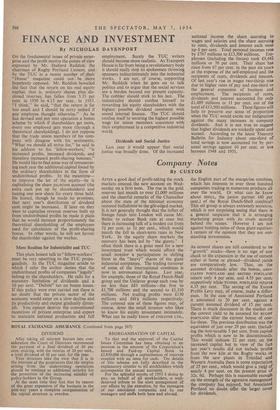FINANCE AND INVESTMENT
By NICHOLAS DAVENPORT ON the fundamental issues of private enter- prise and the profit motive the points of view expressed by Mr. Halford Reddish, the chairman of Rugby Portland Cement, and by the TUC in a recent number of their "House" magazine could not be more hopelessly opposed. Mr. Reddish bewailed the fact that the return on his real equity capital, that is, ordinary shares plus dis- closed reserves, has fallen from 5.33 per cent. in 1950 to 4.12 per cent. in 1953. "I think," he said, "that the return is far too small and I should be sorry indeed if any employee thought otherwise." As he has devised and put into operation a bonus scheme by which if shareholders get more, every one employed gets more (through a theoretical shareholding), I do not suppose that the trade union members of his com- pany will disagree with his sentiments. "What we should all strive for," he said in his address to his 'fellow-workers,' "is increased profits, increased dividends, and therefore increased profit-sharing bonuses." He would like to find some way of remunerat- ing each year the additional capital found by the ordinary shareholders in the form of undistributed profits. In the meantime— to improve the lot of the equity—he is ealiitalising the share prcinium account (the extra cash put up by shareholders) and issuing one new share for every three held. He hinted, though he made no promises, that next year's distribution of dividend cash might be increased. If later on they were to capitalise revenue reserves built up from undistributed profits he made it plain that he would increase proportionately the theoretical shareholding of the employees used for calculation of the profit-sharing bonus. In other words, he will not favour the shareholder against the worker.
More Realism for Industrialist and TUC This plain honest talk to " fellow-workers" must be very upsetting to the TUC propa- gandists. In the TUC magazine article to which I refer the author denies that the undistributed profits of companies "legally" belong to the shareholders. He calls for a statutory limitation of dividends and a 10 per cent. "Dalton" tax on bonus issues. If this policy were ever carried out there is no doubt that the private sector of the economy would enter on a slow decline and its productivity and output gradually dimin- ish. You cannot destroy the conventional incentives of private enterprise and expect to maintain national production and full employment. Surely the TUC writers should become more realistic. As Transport House is far from being a revolutionary body it should really stop its spokesmen throwing spanners indiscriminately into the industrial works. I am not, of course, supporting Mr. Reddish when he goes on to talk politics and to argue that the social services are a burden beyond our present capacity. The cobbler should stick to his last. The industrialist should confine himself to rewarding his equity shareholders with the highest possible dividend consistent with sound internal finance. The TUC should confine itself to securing the highest possible wage for union members consistent with their employment in a competitive industrial world.
Dividends and Social Justice Last year it would appear that social justice was broadly done. Of the increased national income the share accruing to wages and salaries and the share accruing to rents, dividends and interest each went up 6 per cent. Total personal incomes rose by £767 millions to £13,500 millions, Em- ployees (including the forces) took £9,442 millions or 70 per cent. Their share has risen from 67 per cent, in the past six years at the expense of the self-employed and the recipients of rents, dividends and interest. Of last year's rise in wages two-thirds was due to higher rates of pay and one-third to the general expansion of business and employment. The recipients of rents, dividends and interest accounted for only £1,489 millions or 11 per cent. out of the total of £13,500 millions. These figures will help to preserve our sense of proportion when the TUC would excite our indignation against the many increases in company dividends. And it is not true to suggest that higher dividends are wickedly spent and wasted. According to the latest Treasury Bulletin for Industry about one-third of total savings is now accounted for by per- sonal savings against 10 per cent. or less between 1948 and 1951.










































 Previous page
Previous page